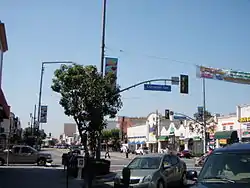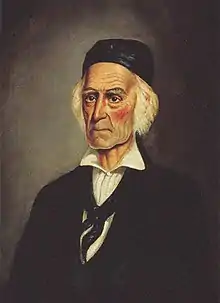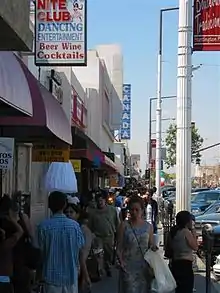Huntington Park, California | |
|---|---|
 Pacific Boulevard and Clarendon Avenue, 2009 | |
 Flag  Seal | |
 Location of Huntington Park in Los Angeles County, California. | |
 Huntington Park, California Location in the United States | |
| Coordinates: 33°59′N 118°13′W / 33.983°N 118.217°W | |
| Country | |
| State | |
| County | Los Angeles |
| Incorporated | September 1, 1906[1] |
| Government | |
| • Type | Council–manager[2] |
| • Mayor | Eduardo Martinez[2] |
| • City Manager | Ricardo Reyes |
| Area | |
| • Total | 3.02 sq mi (7.81 km2) |
| • Land | 3.01 sq mi (7.80 km2) |
| • Water | 0.00 sq mi (0.01 km2) 0.11% |
| Elevation | 171 ft (52 m) |
| Population | |
| • Total | 59,284 |
| • Estimate (2020)[6] | 57,509 |
| • Density | 19,086.96/sq mi (7,370.63/km2) |
| Time zone | UTC-8 (Pacific) |
| • Summer (DST) | UTC-7 (PDT) |
| ZIP code | 90255[7] |
| Area code | 323[8] |
| FIPS code | 06-36056 |
| GNIS feature IDs | 1660778, 2410079 |
| Website | www |
Huntington Park is a city located in the south central region of Los Angeles County, California, United States.
As of the 2010 census, the city had a total population of 58,114, of whom 97% are Hispanic/Latino and about half were born outside the U.S.[9]
In 2019, Huntington Park was ranked lowest in California and 10th-worst nationally on a so-called “misery index”, based on census data compiled by Business Insider, due to factors such as low household income.[10] Nonetheless, Huntington Park and its Pacific Boulevard area are a busy and dynamic hub of the mostly Hispanic, working-class inner Southeast L.A. area.
History

The first European to arrive to the area was Francisco Salvatore Lugo.[11]
Named for prominent industrialist Henry E. Huntington, Huntington Park was incorporated in 1906 as a streetcar suburb on the Los Angeles Railway for workers in the rapidly expanding industries to the southeast of downtown Los Angeles. To this day, about 30% of its residents work at factories in nearby Vernon and Commerce.[12] The stretch of Pacific Boulevard in downtown Huntington Park was a major commercial district serving the city's largely working-class residents as well as being the retail hub of Southeast Los Angeles County. As with most of the other cities along the corridor stretching along the Los Angeles River to the south and southeast of downtown Los Angeles, Huntington Park was an almost exclusively white community during most of its history; Alameda Street and Slauson Avenue, which were fiercely defended segregation lines in the 1950s, separated it from black areas.
The changes that shaped Los Angeles from the late 1970s onward—the decline of American manufacturing that began in the 1970s; the rapid growth of newer suburbs in Orange County, the eastern San Gabriel, western San Fernando and Conejo valleys; the collapse of the aerospace and defense industry at the end of the Cold War; and the implosion of the Southern California real estate boom in the early 1990s—resulted in the wholesale departure of virtually all of the white population of Huntington Park by the mid-1990s. The vacuum was filled almost entirely by two groups of Latinos: upwardly mobile families eager to leave the barrios of East Los Angeles, and recent Mexican immigrants. Today, Pacific Boulevard is once again a thriving commercial strip, serving as a major retail center for working-class residents of southeastern Los Angeles County—only now targeting a Hispanic public with many signs in Spanish.
Geography
Before California abolished judicial townships (some time after 1960), Huntington Park was located in San Antonio Township.
According to the United States Census Bureau, the city has a total area of 3.0 square miles (7.8 km2), all land.
Cities surrounding Huntington Park include Bell, Cudahy, Los Angeles, Maywood, South Gate, and Vernon.[13]
Climate
On average, there are 286 sunny days per year in Huntington Park, California. Annually the snowfall is 0 inches. The July high is around 82 degrees. The January low is 48.[14] As of 2015 the average high temperatures have risen ranging from the low to mid 90s (°F).[15]
Demographics
| Census | Pop. | Note | %± |
|---|---|---|---|
| 1910 | 1,299 | — | |
| 1920 | 4,513 | 247.4% | |
| 1930 | 24,591 | 444.9% | |
| 1940 | 28,648 | 16.5% | |
| 1950 | 29,450 | 2.8% | |
| 1960 | 29,920 | 1.6% | |
| 1970 | 33,744 | 12.8% | |
| 1980 | 45,932 | 36.1% | |
| 1990 | 56,065 | 22.1% | |
| 2000 | 61,348 | 9.4% | |
| 2010 | 58,114 | −5.3% | |
| 2019 (est.) | 57,509 | [6] | −1.0% |
| U.S. Decennial Census[16] | |||
2012
A 2012 study by the California Center for Public Health Advocacy found Huntington Park, California had the highest percentage of overweight children in all of California with 53% of the city's child population being obese or overweight.[17]
2010 census
At the 2010 census Huntington Park had a population of 58,114. The population density was 19,270.0 inhabitants per square mile (7,440.2/km2). The racial and ethnic makeup of Huntington Park was 56,445 (97.1%) Hispanic or Latino, 29,776 (51.2%) White (1.6% Non-Hispanic White), 440 (0.8%) African American, 752 (1.3%) Native American, 393 (0.7%) Asian, 28 (0.0%) Pacific Islander, 24,535 (42.2%) from other races, and 2,190 (3.8%) from two or more races.[18][19]
The census reported that 57,859 people (99.6% of the population) lived in households, 248 (0.4%) lived in non-institutionalized group quarters, and 7 (0%) were institutionalized.
There were 14,597 households, 8,581 (58.8%) had children under the age of 18 living in them, 7,461 (51.1%) were opposite-sex married couples living together, 3,212 (22.0%) had a female householder with no husband present, 1,623 (11.1%) had a male householder with no wife present. There were 1,377 (9.4%) unmarried opposite-sex partnerships, and 81 (0.6%) same-sex married couples or partnerships. 1,644 households (11.3%) were one person and 694 (4.8%) had someone living alone who was 65 or older. The average household size was 3.96. There were 12,296 families (84.2% of households); the average family size was 4.19.
The age distribution was 18,439 people (31.7%) under the age of 18, 6,984 people (12.0%) aged 18 to 24, 17,886 people (30.8%) aged 25 to 44, 10,942 people (18.8%) aged 45 to 64, and 3,863 people (6.6%) who were 65 or older. The median age was 28.9 years. For every 100 females, there were 99.6 males. For every 100 females age 18 and over, there were 97.8 males.
There were 15,151 housing units at an average density of 5,023.9 per square mile, of the occupied units 3,936 (27.0%) were owner-occupied and 10,661 (73.0%) were rented. The homeowner vacancy rate was 1.5%; the rental vacancy rate was 3.2%. 18,054 people (31.1% of the population) lived in owner-occupied housing units and 39,805 people (68.5%) lived in rental housing units.
During 2009–2013, Huntington Park had a median household income of $36,397, with 28.7% of the population living below the federal poverty line.[18]
2000 census
According to the census[20] of 2000, there were 61,348 people in 14,860 households, including 12,660 families, in the city. The population density was 20,252.4 inhabitants per square mile (7,819.5/km2). There were 15,335 housing units at an average density of 5,062.4 per square mile (1,954.6/km2). The racial makeup of the city was 41.4% White, 0.8% Black or African American, 1.0% Native American, 0.80% Asian, 0.1% Pacific Islander, 51.1% from other races, and 4.9% from two or more races. 95.6% of the population were Hispanic or Latino of any race.
As of 2000, speakers of Spanish as their first language accounted for 90.77% of residents, while English was spoken by 9.17%, Chinese by 0.05% of the population.[21]
Of the 14,860 households 58.3% had children under the age of 18 living with them, 55.4% were married couples living together, 20.3% had a female householder with no husband present, and 14.8% were non-families. 10.9% of households were one person and 4.8% were one person aged 65 or older. The average household size was 4.12 and the average family size was 4.34.
The age distribution was 35.8% under the age of 18, 13.0% from 18 to 24, 32.3% from 25 to 44, 13.8% from 45 to 64, and 5.1% 65 or older. The median age was 26 years. For every 100 females, there were 100.3 males. For every 100 females age 18 and over, there were 98.3 males.
The median household income was $28,941 and the median family income was $29,844. Males had a median income of $21,039 versus $16,733 for females. The per capita income for the city was $9,340. About 23.3% of families and 25.2% of the population were below the poverty line, including 31.5% of those under age 18 and 18.7% of those age 65 or over.
Arts and culture

Pacific Boulevard
Architecture
Pacific Boulevard was the busiest shopping district in the southeastern Los Angeles suburbs from the 1930s through the 1950s[22][23] and boasted numerous department stores including the local Wineman's. Notable Streamline Moderne architecture includes the Lane-Wells Company Building and the W. W. Henry Company Building.[24][25] Art Deco architecture is found in Huntington Park's commercial district, and include the former theaters along Pacific Blvd.[26][27] The 1,468 seat Warner Theater on Pacific Boulevard opened in 1930, and was designed by B. Marcus Priteca.[28] The California Theatre opened in 1925 and was operated by Fox Theatres as the Fox California Theatre. In the 1980s it was known as the California 3 Theatre. The theatre closed in 2006 and was later converted into a retail space. It was renamed California 2 Theatres and now there is a tuxedo shop along with other retail stores and restaurants. In 2019 the theater had been converted into a fitness center for recreational use.[29]
Festival and fairs
Pacific Boulevard, the commercial business street of Huntington Park, has been the location for festivals, carnival fairs and parades. The "Carnaval Primavera" is held each year for three days across nine blocks of Pacific Boulevard in Huntington Park. The event features Central American and Mexican food, carnival rides, games, and live music.[30]
Public libraries
County of Los Angeles Public Library operates the Huntington Park Library.[31]
Government
In the Los Angeles County Board of Supervisors, Huntington Park is in the Fourth District, represented by Janice Hahn.[32]
In the California State Senate, Huntington Park is in the 33rd Senate District, represented by Democrat Lena Gonzalez.[33]
In the California State Assembly, Huntington Park is split between the 53rd Assembly District, represented by Democrat Freddie Rodriguez, and the 59th Assembly District, represented by Republican Phillip Chen.[34]
In the United States House of Representatives, Huntington Park is in California's 42nd congressional district, represented by Democrat Robert Garcia.[35]
Education
Huntington Park is zoned to schools in the Los Angeles Unified School District.
Public elementary schools in Huntington Park include:
- Hope Street Elementary School[36]
- Huntington Park New Elementary[37]
- Middleton Elementary School and Middleton New Primary Center
- Miles Elementary School
- Pacific Boulevard School[38]
- San Antonio Elementary School
- Walnut Park Elementary School
- Lucille Roybal- Allard Elementary School[39]
- KIPP Comienza Community Prep
- Aspire: Antonio Maria Lugo Academy
- Aspire: Titan Academy
- Aspire: Junior Collegiate Academy
- Academia Moderna
Public middle schools include:
- Gage Middle School
- Nimitz Middle School
- Centennial College Preparatory Academy
- Aspire: Ollin University Preparatory Academy
- Walnut Park Middle School
- Prepa Tec
- KIPP Comienza Community Prep
Public high schools include:
- Huntington Park High School
- Alliance Collins Family College Ready High School[40]
- Aspire Pacific Academy[41]
- Linda Esperanza Marquez High School
- Maywood Academy High School
- Alliance Margaret M. Bloomfield High School[42]
- Diego Rivera Learning Complex[43]
In addition Pacific Boulevard Special Education Center (ungraded) is in the city.
Private schools include:
- Church of the Nazarene School
- St. Matthias Catholic Elementary School[44]
- Interamerican Adult School
Infrastructure
Emergency services
Fire protection in Huntington Park is provided by the Los Angeles County Fire Department.[45] The Huntington Park Police Department provides law enforcement.
Transportation
Bus services are provided by both the Los Angeles County Metropolitan Transportation Authority, and Huntington Park's own COMBI bus service.[46] Slauson station and Florence station on the Metro A Line are near the city.[47]
Notable people
- Lois Andrews - actress, notable for her portrayal of the comics character Dixie Dugan.
- Elton Gallegly - former US Representative, California's 24th District.
- Leon Leyson - youngest person on Schindler's List, taught at Huntington Park High School.[48]
- Rosario Marin - 41st Treasurer of the United States and a former mayor of Huntington Park.
- Lorenzo Mata - professional basketball player.
- Jeremy McKinney - professional football player.
- Wilbur Nelson - minister at Grace Church of Huntington Park and radio broadcaster.
- Slayer - American Thrash metal band originated out of Huntington Park.
- Tim Wallach - professional baseball player.
- Terry Wilson - stuntman and actor, noted for his role as "Bill Hawks" on the television series Wagon Train.
- Tex Winter - basketball coach.
- MoneySign Suede - rapper who grew up in Huntington Park.
See also
References
- ↑ "California Cities by Incorporation Date". California Association of Local Agency Formation Commissions. Archived from the original (Word) on November 3, 2014. Retrieved August 25, 2014.
- 1 2 "Huntington Park! - City Council". Retrieved December 1, 2020.
- ↑ "2019 U.S. Gazetteer Files". United States Census Bureau. Retrieved July 1, 2020.
- ↑ "Huntington Park". Geographic Names Information System. United States Geological Survey, United States Department of the Interior. Retrieved January 22, 2015.
- ↑ "Huntington Park (city) QuickFacts". United States Census Bureau. Archived from the original on March 31, 2015. Retrieved April 6, 2015.
- 1 2 "Population and Housing Unit Estimates". United States Census Bureau. May 24, 2020. Retrieved May 27, 2020.
- ↑ "USPS - ZIP Code Lookup - Find a ZIP+ 4 Code By City Results". Retrieved January 18, 2007.
- ↑ "Number Administration System - NPA and City/Town Search Results". Archived from the original on September 26, 2007. Retrieved January 18, 2007.
- ↑ Rojas, Leslie Berestein (August 17, 2005). "As Huntington Park Goes, So Southern California". KCET.
- ↑ Pasley, James; Wang, Angela (September 28, 2019). "The 69 most miserable cities in America, based on census data". Business Insider. Retrieved October 3, 2019.
- ↑ https://www.hpca.gov/99/History#:~:text=In%201902%20to%20entice%20Henry,the%20name%20to%20Huntington%20Park.
- ↑ https://www.census.gov Factfinder.census.gov
- ↑ https://www.hpca.gov/DocumentCenter/View/3772/Zoning-Map?bidId= Zoning Map." City of Huntington Park. Retrieved on September 7, 2022.
- ↑ "Climate in Huntington Park, California".
- ↑ "Temperatures have risen in nearly every US state since 1900". September 13, 2017.
- ↑ "Census of Population and Housing". Census.gov. Retrieved June 4, 2015.
- ↑ "Archived copy" (PDF). Archived from the original (PDF) on July 28, 2013. Retrieved July 24, 2012.
{{cite web}}: CS1 maint: archived copy as title (link) - 1 2 "Huntington Park (city) QuickFacts from the US Census Bureau". census.gov. Archived from the original on March 31, 2015. Retrieved January 19, 2015.
- ↑ "2010 Census Interactive Population Search: CA - Huntington Park city". U.S. Census Bureau. Archived from the original on July 15, 2014. Retrieved July 12, 2014.
- ↑ "U.S. Census website". United States Census Bureau. Retrieved January 31, 2008.
- ↑ "Data Center Results - Huntington Park, California". Modern Language Association. Retrieved November 18, 2009.
- ↑ "6351 Pacific Boulevard, Huntington Park". LoopNet.
- ↑ Burns, Melinda (September 4, 1983). "Street Rebounds as Shoppers Return: Pacific Blvd in Huntington Park Recovers From Decade of Decline". Los Angeles Times. p. Southeast Edition p.1.
- ↑ "California Art Deco & Streamline Moderne Buildings (page 3)". Archived from the original on January 20, 2015.
- ↑ "Lane-Wells Company headquarters in Los Angeles, circa 1939".
- ↑ "California Theatre".
- ↑ Kinsey, James (2007). Huntington Park. Arcadia Publishing SC. p. 130. ISBN 9781531628703.
- ↑ "southonspring.com/warner-huntington-park/".
- ↑ "California Theatre". losangelestheatres.blogspot.com. Retrieved September 15, 2018.
- ↑ "Huntington Park Carnaval Primavera".
- ↑ "Huntington Park Library." County of Los Angeles Public Library. Retrieved on December 6, 2008.
- ↑ "Fourth District - Supervisor Janice Hahn". Fourth District - Supervisor Janice Hahn. Retrieved February 21, 2022.
- ↑ "Statewide Database". UC Regents. Archived from the original on February 1, 2015. Retrieved November 6, 2014.
- ↑ "Communities of Interest - City". California Citizens Redistricting Commission. Archived from the original on October 23, 2015. Retrieved November 6, 2014.
- ↑ "California's 42nd Congressional District - Representatives & District Map". Civic Impulse, LLC. Retrieved April 9, 2023.
- ↑ "Project Details". laschools.org. Retrieved January 29, 2015.
- ↑ "Project Details". laschools.org. Retrieved January 29, 2015.
- ↑ "Project Details". laschools.org. Retrieved January 29, 2015.
- ↑ "Lucille Roybal Allard Elementary School: Founders". allardes-lausd-ca.schoolloop.com. Retrieved February 8, 2018.
- ↑ "Alliance Collins Family College Ready High School". www.collinsfamilyjaguars.org. Retrieved October 27, 2015.
- ↑ "Aspire Pacific Academy High School". www.aspirepacificacademy.org. Retrieved March 21, 2018.
- ↑ "Alliance Margaret M. Bloomfield High School". www.bloomfieldhs.org. Retrieved October 27, 2015.
- ↑ "Diego Rivera Learning Complex: Home Page". drlc-lausd-ca.schoolloop.com. Retrieved October 27, 2015.
- ↑ "Saint Matthias School - Huntington Park's Dual Language Immersion Catholic School". saintmatthiasschool.org.
- ↑ "Hometown Fire Stations Archived September 13, 2007, at the Wayback Machine." Los Angeles County Fire Department. Retrieved on December 6, 2008.
- ↑ "HP Express | The Official Site of Huntington Park, CA!". www.hpca.gov. Retrieved April 25, 2022.
- ↑ "Huntington Park · California". Huntington Park · California. Retrieved April 25, 2022.
- ↑ "Leon Leyson's Life Featured in 'A Child on Schindler's List,'" NBC Los Angeles (July 22, 2009).

